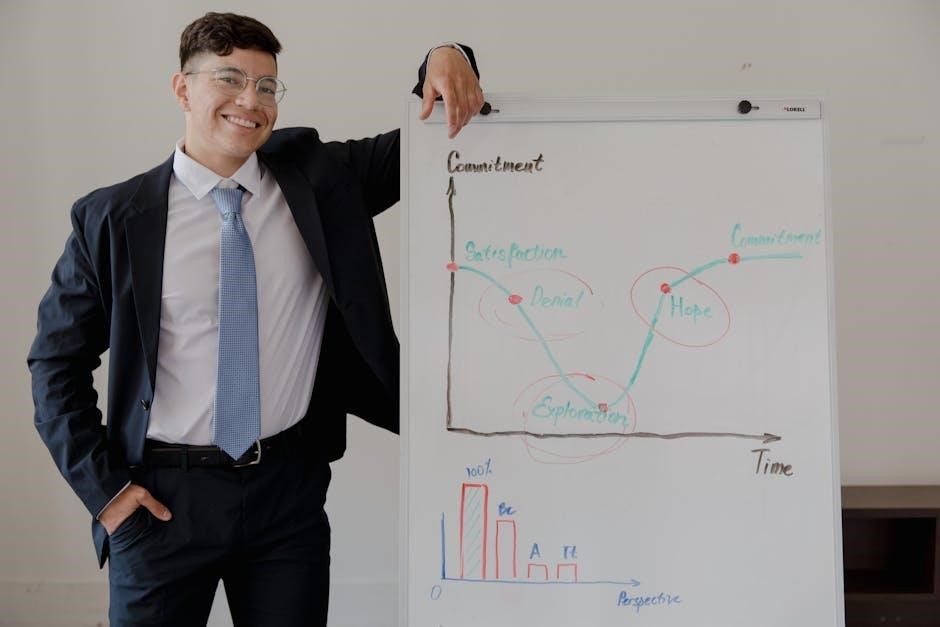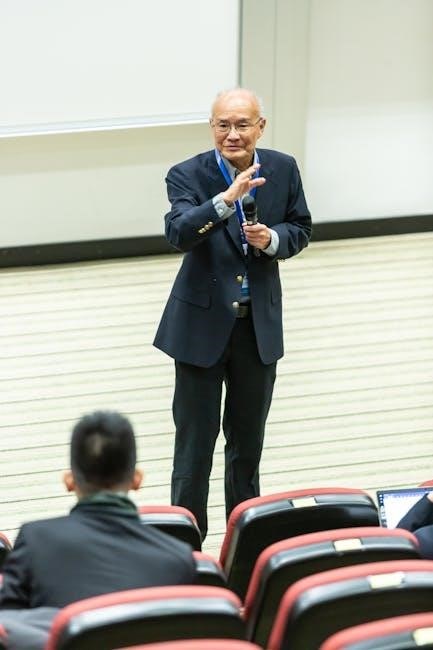The JROTC Leadership Education and Training Program is a high school curriculum designed to develop leadership‚ discipline‚ and citizenship through structured instruction and real-world applications․ It emphasizes personal growth‚ teamwork‚ and service‚ preparing students for future success in various fields․
Overview of the JROTC Program
The JROTC program is a high school initiative led by retired military personnel‚ offering Leadership Education and Training to develop citizenship‚ life skills‚ and character through structured activities and community engagement․
Mission and Objectives
The JROTC program’s mission is to develop informed and responsible citizens by instilling leadership‚ discipline‚ and a sense of service․ Its objectives include fostering teamwork‚ personal responsibility‚ and critical thinking skills․ The program aims to prepare students for leadership roles in their communities and beyond by emphasizing character development‚ civic awareness‚ and academic achievement․ Through structured training and real-world applications‚ JROTC seeks to create a foundation for lifelong success‚ whether in military or civilian life․ The curriculum is designed to promote excellence‚ respect‚ and self-discipline‚ ensuring students graduate with the skills and values necessary to contribute positively to society․
Structure and Components
The JROTC Leadership Education and Training Program is structured as a four-year curriculum‚ with each year building on the previous one․ It includes core courses that focus on leadership development‚ citizenship‚ and life skills‚ as well as elective courses that allow students to explore specialized areas such as drill and ceremonies or aerospace science․ The program is divided into four levels‚ each corresponding to the student’s grade level‚ with increasing responsibility and complexity․ Instructors‚ typically retired military personnel certified by the Department of Defense‚ guide students through both classroom and extracurricular activities․ The curriculum also incorporates hands-on training‚ such as physical fitness‚ drill‚ and community service‚ to reinforce leadership principles․ This structured approach ensures a well-rounded education that prepares students for future challenges‚ whether in further education‚ the military‚ or civilian life․

Leadership Education and Training (LET) Curriculum
The LET curriculum focuses on developing leadership‚ citizenship‚ and life skills through core and elective courses‚ emphasizing practical application and real-world scenarios to prepare students for future challenges․
Core Courses Overview
The JROTC Leadership Education and Training (LET) program is built around four core courses designed to provide a progressive learning experience․ These courses are sequential‚ with each year building on the previous one to ensure a comprehensive foundation in leadership‚ citizenship‚ and life skills․ The first-year course introduces students to the JROTC program‚ emphasizing U․S․ citizenship‚ military history‚ and basic leadership principles․ The second year focuses on intermediate leadership skills‚ including communication‚ teamwork‚ and community service․ The third year delves into advanced leadership concepts‚ such as decision-making and problem-solving‚ while preparing students for leadership roles within the program․ The fourth year emphasizes practical application of skills‚ focusing on mentoring younger cadets and preparing for post-high school opportunities․ Together‚ these core courses create a structured pathway for cadets to develop the abilities necessary for success in both military and civilian life․
Elective Course Options
In addition to the core courses‚ the JROTC Leadership Education and Training (LET) program offers elective options tailored to students’ interests and career goals․ These electives provide specialized knowledge and skills‚ enhancing the overall educational experience․ Topics include leadership theory‚ advanced citizenship studies‚ and practical applications of STEM principles․ Some electives focus on specific areas such as military history‚ while others emphasize personal development through community service and mentorship․ These courses are designed to encourage cadets to explore their passions and strengths‚ preparing them for diverse career paths․ By offering a range of electives‚ the JROTC program ensures that students can customize their learning experience‚ gaining a deeper understanding of leadership and citizenship while developing skills relevant to their future aspirations․
Curriculum Design and Development
The JROTC Leadership Education and Training (LET) curriculum is meticulously designed to align with educational standards and military values․ It incorporates performance-based‚ learner-centered principles‚ focusing on core abilities such as leadership‚ citizenship‚ and life skills․ The curriculum is structured to promote critical thinking and problem-solving‚ ensuring students are well-prepared for future challenges․ Regular updates and modernization efforts ensure relevance and adaptability to changing educational needs․ By integrating hands-on activities‚ real-world applications‚ and collaborative learning‚ the curriculum fosters a dynamic and engaging environment․ This approach not only enhances academic performance but also builds character and resilience‚ equipping students to excel in both military and civilian contexts․ The design process involves feedback from educators‚ military personnel‚ and alumni‚ ensuring the curriculum remains effective and impactful․

Role of Instructors in JROTC
Instructors in JROTC are retired military personnel certified by the U․S․ Department of Defense․ They teach leadership‚ citizenship‚ and employability skills‚ using the JROTC framework to inspire and guide students․
Background and Qualifications
JROTC instructors are typically retired military personnel with extensive experience in leadership and education․ They must hold a bachelor’s degree and have a minimum of 20 years of military service․ Many instructors also have teaching experience‚ either from their military careers or through civilian education․ To qualify‚ they must undergo a background check and receive certification from the U․S․ Department of Defense; Instructors are hired by both the military branch and the school district‚ ensuring they meet both educational and military standards․ Their military background provides students with real-world examples of leadership‚ discipline‚ and service․ This unique blend of military and teaching expertise enables instructors to effectively mentor students in leadership‚ citizenship‚ and life skills․ Their qualifications ensure a high level of professionalism and credibility in the JROTC program․
Certification and Training
JROTC instructors undergo rigorous certification and training to effectively teach and mentor students․ Certified by the U․S․ Department of Defense‚ instructors must complete specialized training programs focused on curriculum delivery‚ leadership development‚ and classroom management․ These programs ensure instructors are well-versed in the JROTC curriculum‚ which emphasizes leadership‚ citizenship‚ and life skills․ Additionally‚ instructors participate in annual professional development sessions to stay updated on educational methodologies and curriculum changes․ Their training also includes workshops on fostering teamwork‚ discipline‚ and personal responsibility among students․ This comprehensive certification and training process equips instructors with the tools to inspire and guide students effectively‚ ensuring the program’s goals are met․ Continuous training also helps instructors adapt to evolving educational standards and student needs‚ maintaining the program’s relevance and effectiveness․

Program Outcomes and Assessment
The JROTC program fosters leadership‚ citizenship‚ and life skills‚ measured through assessments‚ cadet performance‚ and community involvement‚ ensuring students achieve personal and academic growth aligned with program goals․
Leadership Skills Development
The JROTC program places a strong emphasis on developing leadership skills‚ teaching students to take charge and guide others effectively․ Through structured training and real-world applications‚ cadets learn decision-making‚ problem-solving‚ and communication․ They participate in activities such as command positions‚ team-building exercises‚ and community projects‚ fostering confidence and responsibility․ The curriculum includes lessons on leadership principles‚ ethical decision-making‚ and the importance of mentorship․ Instructors‚ often retired military personnel‚ provide guidance and support‚ helping students build a strong foundation for future leadership roles․ By focusing on practical experience and hands-on learning‚ JROTC equips students with the skills to lead and inspire others‚ preparing them for success in both military and civilian life․ This approach ensures that cadets develop into capable and compassionate leaders‚ ready to make a positive impact in their communities․
Citizenship Education
The JROTC program places a strong emphasis on citizenship education‚ aiming to instill a sense of duty‚ responsibility‚ and pride in students’ roles as U․S․ citizens․ Through structured lessons‚ cadets learn about the rights and responsibilities of citizenship‚ the importance of community service‚ and the value of contributing to society․ The curriculum includes instruction on U․S․ history‚ government‚ and the principles of democracy‚ ensuring students understand their role in maintaining freedom and equality․ JROTC also encourages participation in civic activities‚ such as parades‚ ceremonies‚ and volunteer work‚ fostering a sense of patriotism and commitment to the community․ By teaching the importance of service and responsibility‚ JROTC helps students develop into informed‚ engaged‚ and responsible citizens prepared to contribute positively to society․ This focus on citizenship ensures that graduates are not only leaders but also active participants in shaping their communities’ futures․
Assessment Methods
The JROTC program employs a variety of assessment methods to evaluate student progress and understanding․ These include written exams‚ performance-based evaluations‚ and practical exercises that test leadership skills and knowledge retention․ Cadets are also assessed through portfolio reviews‚ which showcase their personal growth and achievements throughout the curriculum․ Additionally‚ instructors observe students during drills‚ community service projects‚ and team-building activities to evaluate their ability to apply learned concepts in real-world scenarios․ Assessments are designed to measure mastery of core competencies‚ such as leadership‚ citizenship‚ and problem-solving‚ ensuring students are well-prepared for future challenges․ The program also incorporates peer evaluations and self-assessments to foster a culture of continuous improvement and accountability․ These methods collectively provide a comprehensive understanding of each cadet’s development and readiness for leadership roles․
Benefits of JROTC Participation
JROTC participation enhances leadership skills‚ promotes academic success‚ and fosters personal growth․ It offers scholarships‚ college opportunities‚ and prepares students for future careers while building strong‚ responsible citizens․
Academic Benefits
The JROTC Leadership Education and Training Program offers significant academic benefits‚ fostering improved grades and higher graduation rates․ By integrating STEM-based education‚ the curriculum enhances critical thinking and problem-solving skills․ It emphasizes core subjects like geography‚ wellness‚ and life success‚ providing a well-rounded education․ The structured learning environment encourages discipline and focus‚ translating to better academic performance․ Additionally‚ JROTC courses are designed to align with high school requirements‚ ensuring students meet graduation standards․ The program also promotes college readiness by teaching employability skills‚ teamwork‚ and personal responsibility․ Many cadets report improved time management and study habits‚ leading to higher GPAs․ Furthermore‚ JROTC’s focus on leadership and citizenship equips students with confidence and a strong work ethic‚ benefiting their academic and future professional pursuits․ Overall‚ the program serves as a catalyst for academic success and lifelong learning․
College and Career Opportunities
The JROTC Leadership Education and Training Program significantly enhances college and career opportunities for participants․ By fostering leadership‚ discipline‚ and teamwork‚ the program equips students with skills highly valued by colleges and employers; Many JROTC cadets earn scholarships and admission to prestigious universities‚ while others pursue military careers․ The program’s emphasis on STEM education‚ life success skills‚ and personal responsibility prepares students for diverse career paths․ Additionally‚ JROTC instructors‚ often retired military personnel‚ provide mentorship and guidance‚ helping students navigate college applications and career planning․ The structured curriculum also promotes critical thinking and problem-solving‚ making graduates more competitive in the job market․ For those interested in military service‚ JROTC provides a strong foundation for officer training programs․ Overall‚ the program bridges high school education with future opportunities‚ empowering students to succeed in college‚ careers‚ and beyond․

Challenges and Controversies
The JROTC program faces challenges‚ including the JROTC Safety Act addressing instructor misconduct and debates over mixing military training with high school education‚ sparking controversy about its purpose and impact․
JROTC Safety Act
The JROTC Safety Act was introduced following reports of widespread sexual misconduct by instructors within the program․ This legislation aims to enhance safety measures and accountability‚ ensuring a secure environment for cadets․ It mandates stricter background checks for instructors and establishes clearer reporting protocols for incidents․ The Act also promotes transparency by requiring annual reports on safety and misconduct cases․ These measures are designed to protect students while maintaining the program’s educational and leadership goals․ The implementation of the JROTC Safety Act reflects a commitment to addressing past failures and safeguarding the well-being of participants․ By fostering a safer environment‚ the Act supports the program’s mission to develop responsible citizens and leaders․

Expansion and Growth of JROTC
The JROTC program is expanding to new schools‚ with Brighton launching its program in 2025 and Knox County introducing its first middle school JROTC․ This growth reflects the program’s increasing popularity and its proven benefits in developing leadership‚ discipline‚ and citizenship among students․
New Schools Adopting the Program
The JROTC program is experiencing growth as new schools adopt it‚ with Brighton set to launch its program in 2025․ Knox County is also introducing its first middle school JROTC‚ expanding opportunities for younger students․ These new adoptions highlight the program’s increasing popularity and its proven success in developing leadership‚ discipline‚ and citizenship․ Schools recognize JROTC’s ability to prepare students for future challenges‚ fostering personal responsibility and a sense of accomplishment․ By integrating structured training and STEM-based education‚ JROTC equips students with essential life skills․ The expansion underscores the program’s value in shaping tomorrow’s leaders and engaged citizens‚ offering a well-rounded education that goes beyond traditional academics․ This growth reflects the positive impact JROTC has on students and communities‚ encouraging more schools to embrace the program․
Real-World Impact and Examples
JROTC’s real-world impact is evident through summer camps and training‚ transforming students’ lives․ Programs like Enterprise High School’s JROTC and Angel Mariscal’s transformative experience highlight leadership growth and personal development․
Summer Camps and Training
Summer camps and training programs are integral to the JROTC experience‚ offering cadets hands-on leadership development and real-world applications of the curriculum․ These programs often include physical training‚ drills‚ and team-building exercises designed to foster resilience‚ discipline‚ and teamwork․ For example‚ students like Angel Mariscal have shared how these camps transformed their lives‚ teaching valuable life skills and reinforcing the program’s core values․ Cadets participate in structured activities that simulate military training environments‚ allowing them to apply leadership principles learned in the classroom․ The camps also emphasize community service‚ further aligning with JROTC’s mission to develop well-rounded citizens․ Through these experiences‚ students gain confidence‚ strengthen their problem-solving abilities‚ and build lasting bonds with peers․ The combination of challenging activities and mentorship from instructors creates a transformative experience that prepares cadets for future challenges․
Future of JROTC
JROTC’s future includes expansion to new schools‚ modernization of curriculum‚ and implementation of the JROTC Safety Act to ensure program growth and cadet development․
Modernization Efforts
The JROTC program is undergoing modernization to align with contemporary educational standards and student needs․ Efforts include updating curriculum materials‚ integrating STEM-based education‚ and incorporating digital tools for interactive learning․ The program now emphasizes critical thinking‚ problem-solving‚ and collaboration to prepare students for a rapidly changing world․
Modernization also involves updating textbooks and instructional resources to reflect current global issues‚ cultural diversity‚ and technological advancements․ Additionally‚ there is a focus on mental health awareness and emotional intelligence to foster well-rounded development․ These changes aim to enhance the program’s relevance while maintaining its core mission of building leadership and citizenship․
The JROTC Leadership Education and Training Program is a transformative initiative that fosters leadership‚ citizenship‚ and personal growth among high school students․ By blending structured curriculum‚ hands-on training‚ and real-world applications‚ JROTC equips cadets with essential life skills‚ preparing them for future challenges․ The program’s emphasis on teamwork‚ discipline‚ and service has proven to enhance academic performance‚ career readiness‚ and community engagement․ Modernization efforts‚ including updated curriculum and STEM integration‚ ensure its relevance in a changing world․ As JROTC continues to expand and evolve‚ it remains a vital resource for developing capable and responsible leaders․ For many students‚ the program is a life-changing experience that instills confidence‚ resilience‚ and a sense of purpose‚ shaping their paths beyond high school․
